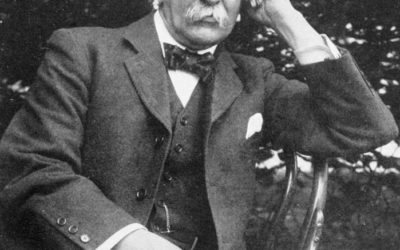Sir William Osler was said to be the “Father of Modern Medicine” and the first to bring medical students from the lecture hall to the clinical bedside.
Source – Prof Oliver Wong, Wellcome Images Library *
Part 1 – The Medical Educator
Credit where it’s due, Mike D’Alessandro appears to be the first doctor to write about the potential of Personal Learning Environments in Medical Education, writing here about development of a course using the concept in the Journal of Pediatric Radiology in 2011.
A personal learning environment helps learners take control of and manage their own learning. By entering cases into a learning portfolio you store your experience, reflection, knowledge and wisdom and create your own knowledge management and E-memory system. Furthermore, by participating in a community of practice where you contribute content, engage in conversations and make connections you are enabling peer-to-peer and master-to apprentice teaching. In the future it is hoped that tying your learning to your practice and being awarded continuing medical education credit for it will fulfill a larger role in the process of Maintenance of Certification and Continuing Professional Development.
Recently I presented the concept at a meeting of Clinician Educators at the 2015 International Conference on Residency in Vancouver. For want of a better definition this was a group of medical educationalists, those that have a role (or several roles) in teaching medicine to other doctors. The participants appeared to find the concept helpful to their own practice. Many had already thought about their personal learning networks in a technology sense, see here recent ICE blog by Felix Ankel and Anand Swaminathan but only perhaps in the sense of how they might share information about medical education. The PLE concept can be seen as extending the Personal Learning Network (PLN) further into additional areas such as storing, remembering and retrieving. Many of those who attended could also see that both the technological and the non-technological were valid in constructing their own personal learning networks with many reflecting on how, for example the concept of peer review is drawn into a PLE.
The Clinician Educators present could see some of the opportunities as wells as challenges presented by the PLE concept. We looked at some of the questions posed by Hicks and Sinkinson in their 2014 open source article:
- What capacities and practices will learners and teachers need to develop?
- How will the learner and teacher role be defined within these approaches?
- What barriers will inhibit the exploration of these approaches?
- What components of the traditional approach should be protected and maintained?
If we focus on each of these questions in turn:
For question one – if we do accept the PLE concept then the medical educator of today and tomorrow will need to develop capacities and practices to be informed of the types and kinds of learning environments his/her medical learner is involved with. It obviously will be important to attempt to ascertain what sorts of sources of information learners are using and sharing, for e.g. blogs and podcasts and consider the credibility of some of the more common sources at least. However, it is likely to quickly challenge the time and resources of the medical educator if they endeavour to map each of their learners PLE (not to mention that perhaps the learner may not wish to give access to certain aspects of their PLE.
This then turns us to question two and the potential importance of the medical educator focusing on their role as both a facilitator of learning but also a facilitator of critical analysis and thinking, so as to encourage the medical learner not to believe everything that is written on the internet and perhaps also consider the risks of “group-think” in the construction of knowledge.
For question three many barriers may inhibit the medical educator, some of which may not be in their own control to address, for example working within institutions which close off their learning management systems and eportfolio systems and even worse parts of the internet itself.
Finally for question four if the medical educator manages to successfully address some of the issues raised by the previous questions there opens up a possible opportunity for them to focus on those aspects of learning that truly have an impact for their particular training endeavour by for example, removing the need to teach and provide information sources for a large swathe of the curriculum and then focusing more on issues such as practical skills development, work-place based assessment or developing reflective-practice skills in the medical learner.
The above is by no means a comprehensive assessment of the impact of these questions for medical education but hopefully might guide the reader to why I think this is an area worthy of further investigation.
Next blog I will attempt to touch on a definition of PLEs as well as speak to the potential relevance to medical learners.


Leave a Reply